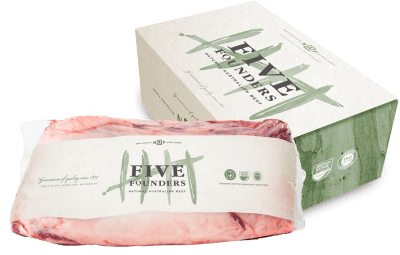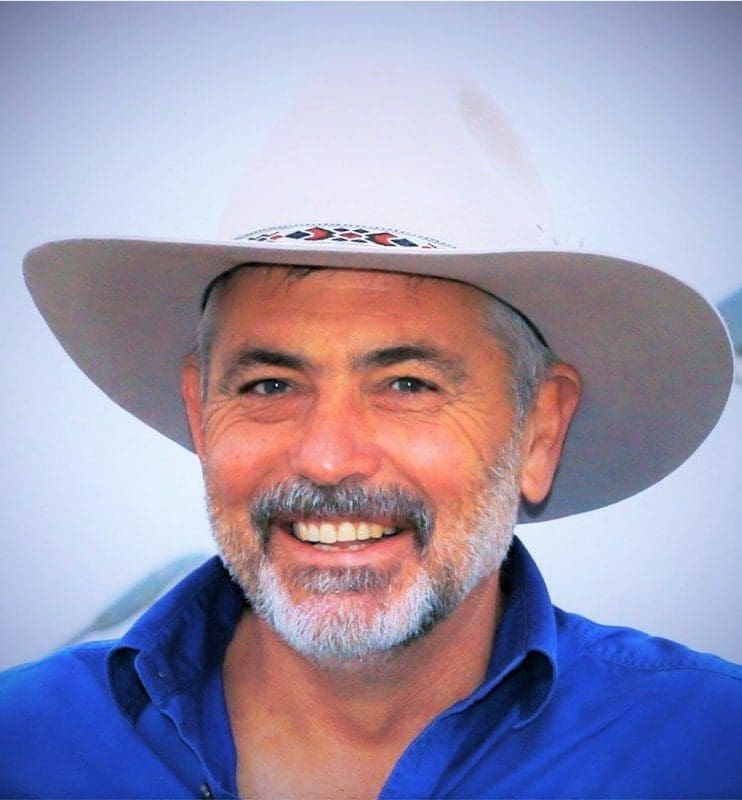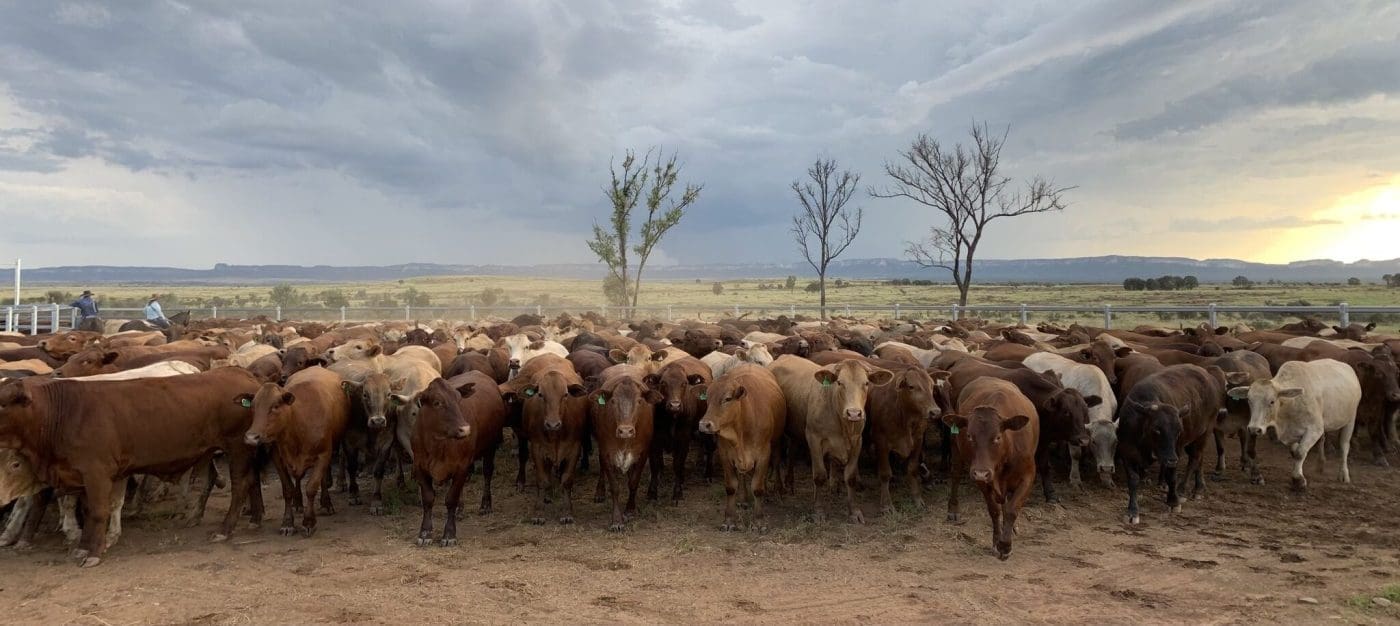This article is part of a series of case studies AgCarbon Central is doing on producers of all shapes and sizes doing interesting work in the carbon and environmental sectors. Today’s story is on NAPCo, which has been marketing carbon neutral beef since April 2019. More case studies at the bottom of this article.
WITH five years of perspective on the marketing of carbon neutral beef, one of Australia’s largest cattle companies says data collection has become its most powerful tool in navigating the rapidly changing part of the industry.

NAPCo’s Five Founders beef brand carries a strong environmental message underpinned by carbon neutrality
The North Australian Pastoral Co started claiming carbon neutral status on its Five Founders beef brand in 2019 – with the aim of leading the industry’s emissions reduction focus.
In its early years, the purchase of carbon credits has been the main contributor to NAPCo’s carbon neutral claim. However, the medium-to-long term goal is to reduce emissions from within its own company and make the entire operation “net zero”.
Several initiatives to reduce emissions are already in place, including a switch to solar for water pumps and homesteads, introducing legumes to reduce methane and sequester more carbon and a focus on increasing weight gains to get cattle to feedlots quicker.
General manager of sales and marketing James Carson said for the past year the organisation has been scaling up the use of the methane reducing feed additive Bovaer.
“We have been feeding the Five Founders cattle now for a year, which turns off about 300/week and will soon go up to 360/week,” Mr Carson said.
The company is also working with the University of New England and Meat & Livestock Australia to use the additives in grazing systems through supplementary feeding.
NAPCo has always said the carbon neutral beef brand was done in response to demand from customers. Mr Carson said it has had its most success with corporate customers also trying to lower their carbon footprint.
“The carbon neutral claim continues to open many doors for us,” he said.
“Where we are getting traction is from large corporations, like big hotel chains, that have their own ESG targets and are looking for at least part solutions in decarbonising their supply chains. We are also selling beef to organisations who want to know what reduced footprint we have compared to others in the industry.”
Asked about whether the carbon neutral beef was demanding a premium Mr Carson said it was hard to quantify.
“What we can say with confidence is that the pricing we have received in the tough times is comparable to some of the leading brands in Australia,” he said.
“We are also seeing opportunities in countries like Japan, where the corporations take the agenda of the Government very seriously.”
Changing goal posts frustrating northern industry
Alongside the methane reducing feed additives, NAPCo has been looking into starting a series of carbon projects to offset its emissions for the the Five Founders brand – through soil, vegetation and creating efficiencies in the management of its herd.
The company had been looking at starting a series of ‘human induced regeneration’ projects before the methodology ceased to exist at the end of last year. The projects are on hold while the carbon industry and Federal Government develops a new methodology called Integrated Farm and Land Management.

Allan Cooney
It also has a beef herd reduction project registered but has had to hold back its submission for credits as the regulator works through “errors” in the calculator.
Chief executive officer Allan Cooney said constant changing of the rules were becoming frustrating for the industry.
“We are stuck in this limbo where the regulator is not keeping up with the industry,” Mr Cooney said.
“That is not just us, we are part of the northern pastoral industry and collectively we have a couple of million head under our management. Everyone in that group is busting at the seams to get these projects going and it is quite frustrating.”
Company watching climate neutral debate closely
In recent times, the industry has been pushing regulators to recognise the short-lived nature of livestock methane emissions and shift targets from “carbon neutral” to “climate neutral”.
Mr Cooney said the debate has raised some questions about whether the industry should be focusing so hard on reducing methane.
“Internally, we are separating the two gases and reporting on the two. But we don’t have the option to do that externally because the Government accounting says methane as a cumulative gas,” he said.
“I think it is a real issue for industry because we are held to account for our emissions the same way mining companies are held to account for theirs and it is not a fair comparison.”
Mr Cooney said the company was working on reducing its use of fossil fuels to limit its cumulative gases.
“If we are serious about this, then we should be doing something the cumulative gases,” he said.
“Reducing the cyclical gases is a lot harder and we often question whether we should have to do it because the methane we emitted 10-12 years ago is no longer there.”
Data collection the most important part
While the company has been feeding Bovaer to its feedlot cattle for the past year, it has not been able to claim the emissions reduction in its carbon neutral brand.
An industry group is currently working to create a methodology to claim carbon credits for feed additive use, but AgCarbon Central understands the outcome of that process is a way off.
Mr Carson said NAPCo was looking at using international carbon schemes to claim the emissions reduction from Bovaer.
“As there is no methodology available in Australia, we have had to look overseas to claim credits or use them as an inset,” he said.
Mr Carson said data collection was the most important part of the carbon neutral venture.
“We have the power to not just sell carbon neutral meat, but to also sell meat that has a carbon footprint attached to it,” he said.
“The most powerful part of that is the data we are collecting.”
Mr Carson said NAPCO was watching industry discussion closely and was involved where possible. He said the debate reinforced the need to collect data.
“We are very conscious of what the market is wanting out there, not only from a customer perspective, but from an industry perspective,” he said.
“When you have data on meat, then you can chose what you decide to do and move with market forces – whether you decide to be carbon neutral or take advantage of other opportunities to sell a carbon reduced product.”
NAPCo’s marketing manager Marnie Crawford said it was also important to be watching the regulatory environment closely.
“We need to be mindful of what is happening in the political arena, whether it is new frameworks or new status of greenwashing – we have always been really cognisant and aware of this,” Ms Crawford said.
“Staying aware of overseas legislations with an eye on what will assist our market access, remains top of mind.”
More carbon case stories
- How gathering soil carbon data is setting the Archers up for the future
- Carbon case: challenges ahead for Jigsaw Farms to maintain carbon neutral status
- Carbon case: with great numbers of soil carbon credits comes great responsibility
- Carbon case: getting the most out of carbon through sustained management
- Carbon case: small scale, high value the key for reef catchment cattle property




Looking from outside of Australia – NAPCo is clearly a world leader in the beef sector in demonstrating what is possible with Carbon Credit schemes. The global beef industry policy makers need to learn from the NAPCo experience and recognise the honest reporting in this article.